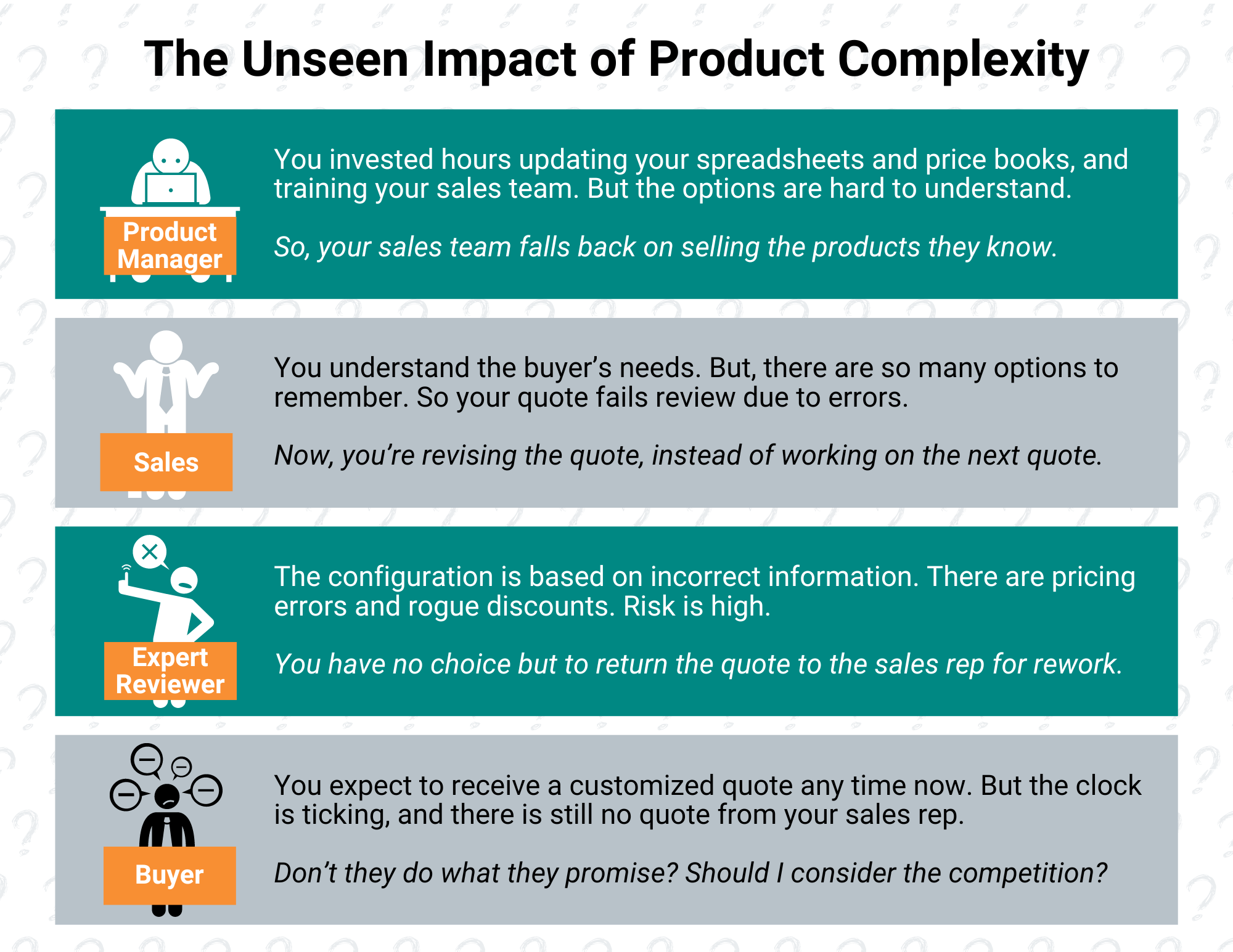Managing product complexity is key to capitalizing on customer interest. For management, it’s a strategic revenue lever. You can target a wider demographic, expand into new markets and grow. For sales, it’s a competitive advantage. You can fulfill a larger range of buyer needs to create more revenue and expand your customer base.
If not managed well, however, product complexity can also increase your costs, confuse your customers and stall your sales cycle.
How do you simplify your complex product management without losing your competitive advantage?
What is Product Complexity
Product complexity is the number of parts, configurations and customizations that make up each of your products. Or, the number of features, options and integrations that each of your products offer. The more features and options each of your products offer your customers, the greater their complexity.
As customers develop more diverse needs, your product complexity increases to keep pace with ever-growing demands. For example:
- The number of components and functionalities increases.
- The level of interdependencies between different parts increases.
- The intricacy of assembling components increases.
- The volume of industry regulations increases.
In fact, every change, whether a new product or new product feature, option or customization, increases your product complexity.
If your products are complex, you’re not alone. Nearly every industry today, from manufacturing to business services is more complex than they were just five years ago. And this trend shows no signs of slowing.
The Impact of Product Complexity
To be clear, product complexity is not bad. It’s your competitive edge. But, the more complex your products, the more complex your supporting business operations. And the more time and resources they take to manage.
To illustrate, let’s look at the impact of unmanaged product complexity on four key business scenarios:

These frustrating scenarios play out again and again in business. Right down the hall from you. Consuming time and resources and slowing down your time-to-market and your sales cycle.
The more complex your product, the longer it takes for your organization to understand and adopt. To take a product to market. To develop accurate quotes, review and approve. To get a quote to a buyer. And for buyers to make a decision.
Managing Product Complexity
Product complexity management does not mean simplifying your complex products. That would lose you your competitive advantage. And it’s not that your products are too complex. They are the right amount of complex for your target market, segments and customers.
It’s just that managing your product complexity takes too much work, and rework, to capitalize on your complexity and achieve your revenue goals.
How can you overcome product complexity challenges? And maintain your competitive advantage? Start with proven strategies for managing product complexity development. And make it easier for your organization and your customers to understand.
- Standardize. Can you create modular or component-based building blocks? This can make it easier for product managers to add new products and reduce your time-to-market. And sales to understand and adapt to new offerings.
- Prioritize. Can you use feature prioritization techniques? This can make it easier for your sales team to understand new features and capture buyer interest. Before your competition does.
- Leverage. Are you leveraging data and metrics for insights? This can make it easier for you to see if buyers understand your product complexity. So you can tailor your approach and better allocate resources.
- Centralize. Can you centralize complex product information? And automate updates? This can make it easier to ensure everyone is on the same page. And selling based on the same source of information.
Tools for Managing Product Complexity
Product complexity is an inevitable part of business. You either choose to ignore it and stall your sales cycle. Or you choose to embrace it and capitalize on your competitive advantage.
While you may not be able to control that complexity happens, you can control the impact product complexity has on your organization and your customers. .
In fact, with the right methodologies and tools, you can tame the product complexity beast. And unlock your full revenue potential.
- Implement Product Lifecycle Management (PLM) software to help map complex product development. This will also help sales visualize product features, the functions they perform and their associated dependencies.
- Implement Configure-Price-Quote (CPQ) software to standardize and centralize complex product options and pricing and automate processes. This will also help sales communicate accurate information and quotes that meet the precise needs of customers faster.
- Invest in training programs that arm sales with the knowledge and understanding they need to easily navigate complex product portfolios with confidence. This will also reduce your time-to-market.
- Foster cross-functional collaboration between product managers, sales and experts to ensure a cohesive understanding of complex products. This will also reduce review delays and streamline the quote approval process.
- Leverage Customer Relationship Management (CRM) software to track buyer preferences. This will also enable more targeted sales approaches and more personalized customer interactions that build trust.
Managing product complexity is pivotal for sustained business success. While software solutions can play a crucial role, a holistic approach involving training, collaboration and strategic decision-making is equally important. By adopting a combination of these solutions, businesses can successfully manage product complexity, drive efficiency and unlock their full revenue potential.
Learn more about how Configure-Price-Quote (CPQ) software can help you manage product complexity and conquer complex quotes in minutes.
Related Article: How CPQ Helps Manufacturers Accelerate Quoting










